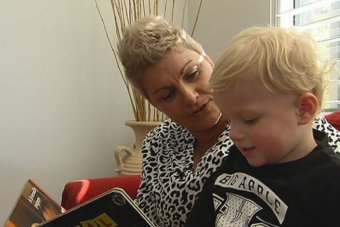When Amanda Ayliffe was just 34 years old she decided to find out whether she had a future or not.
Having lost both her father and uncle to Alzheimer’s disease before the age of 60, she underwent a genetic test to discover whether it could also be her fate.
The test came back positive.
“I was shattered,” she said.
“I went on to think: ‘well I’ll never get Alzheimer’s. I’ll be the one they take to America and show off’.”
More than a decade later when she started feeling stressed and forgetful at work, she put it down to menopause.
Over time, she was forced to acknowledge it might be the start of mental deterioration.
“It was pretty devastating to think it could be that starting,” she said.
“I can’t explain how I felt. It was just horrible.”
Now, at 46, she has come to terms with the fact that her life has had to change. She has stopped working and had to tone down her social life.
“I used to be able to have a function here, a Christmas function, just a Tupperware party or friends and family over. I could think of a thousand things at once, all of that, cook and talk.
“I now can’t. I have to fully concentrate on what I’m doing.”
She likens her symptoms to static on a television screen.
“It’s just all fuzzy. That’s what my brain gets like if I’ve got to do too many things at once.”
A big part of her acceptance is trying to break her family’s cycle of Alzheimer’s disease.
Amanda’s family is one of only about 20 families in Australia with a rare genetic variant that predisposes them to the degenerative disease.
Unlike some other illnesses both the genetic and general forms of Alzheimer’s are thought to work the same way.
Amanda is one of a handful of patients taking part in a trial of a promising treatment that is hoped could prevent Alzheimer’s disease.
“Ultimately I would love for there to be a cure,” Amanda said.
“If not for me, for my children and everybody else in the population that has to endure such a horrible disease.”
Researchers say these families have a unique role to play in battling the illness overall, because they know about half of them will likely go onto develop symptoms.
Up to 400,000 people are predicted to have dementia by 2025, and about 70 per cent of them will have Alzheimer’s disease.
Drug to target plaque of the brain
In this study researchers are taking about 20 healthy Australians with the Alzheimer’s gene and administering a specially-designed drug.
It is part of a drug trial involving more than 200 people around the world.
Alzheimer’s trial
- The trial: 200 people globally with a family history of Alzheimer’s
- The drug: Targets amyloids that build up and create plaques in the brain, it binds to them and is flushed from the brain preventing brain damage
- Who it can help: Initially potentially people with a genetic predisposition but hopefully people with Alzheimer’s generally, Parkinson’s disease and other kinds of dementia
For more information: www.brainpet.org
The drug, which cannot be named because it is still being trialled, targets the build-up of amyloids in the brain.
These build-ups form plaques which are thought to cause the damage that ultimately leads to Alzheimer’s.
It is hoped the drugs will bind to the amyloids and be flushed from the brain, and Alzheimer’s will not develop.
Using high-tech scans, researchers will compare the damage occurring in the brain over time through Alzheimer’s to what a healthy brain looks like.
Dr Bill Brooks from Neuroscience Research Australia said the drug was not a cure.
He said it had been tried on people with advanced Alzheimer’s with no result.
“This is much more likely to be a preventative drug than for people with established symptoms,” he said.
But Dr Brooks is also hopeful.
He said when he began research three decades ago there were no biomarkers or scans to detect Alzheimer’s, now there are both, and a potential preventative treatment.
“This is a huge step forward,” he said.
“It could help the vast majority of people with Alzheimer’s disease or at risk of Alzheimer’s disease who don’t have a genetic predisposition.
“And, it could help people with other causes of dementia like frontotemporal dementia, Lewy dementia and perhaps even Parkinson’s disease.”
Professor Chris Rowe from Austin Hospital said the reasearch would not have been possible without the generosity of families with the rare genetic strain.
“We can’t make medical advances if we don’t have people volunteering for research,” he said.
“If this works we will have an effective treatment for Alzheimer’s disease, not only for these people with this rare young onset form, but for Alzheimer’s disease in general.
“That will have enormous benefit to society – economically, reducing suffering for patients and the care givers.”
Amanda said her middle daughter was now considering getting tested for the gene.
She said she hoped the drugs would enable her to spend her precious time with her grandson Harry.
“If a cure doesn’t happen in my time it’s going to help my kids and the rest of the population who has to endure Alzheimer’s.”
For more information on the trial: http://www.austin.org.au/cognitiveresearch and https://www.neura.edu.au/DIAN


